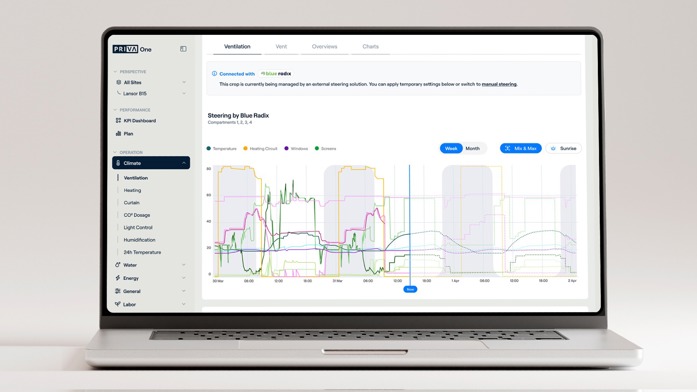Data integration for a company-wide perspective
Priva One integrates data for a company-wide perspective. The system, officially launched this summer, is the "ultimate integrated solution for predictive and scalable cultivation," according to the De Lier-based climate computing specialists. CEO Hans Peters summed it up during GreenTech Amsterdam 2024:
"Things are increasingly fluctuating in and around the greenhouse. Think about energy, climate, and sustainability. Moreover, more and more parties bring extra intelligence to cultivation with their technologies. With Priva One, we integrate solutions from partners such as Blue Radix, IUNU, and Source.ag."
The first step in the digitization of horticulture was the move to Excel. Dirk: "Growers started looking at data to make decisions. You could exchange data from Priva, with a CSV file." But that's a technology of the past. It still works, but that's no way to keep up with the recent digitization of horticulture. "Thanks to data exchange via APIs, Priva One is able to support growers in growing crops profitably at scale."
Their software developers are increasingly asking for APIs.Dirk: "They no longer want CSV files." Priva's Open Platform and API links open a lot of doors, he notes. "This makes the full potential of data available to the market."
Feedback from the plant
The development of Priva One goes step by step. Within Priva One, there is data for the entire cultivation cycle and data for the 24-hour cycle. Dirk notices an increasing need for sensors that tell what the plant has done. These kinds of sensors provide data on how the crop has responded.
How did a specific variety perform? What was causing the disturbance? Why is production down? Accurate, up-to-date data which provides crop insight is going to help growers with understanding what needs attention, and to make better, data-driven choices."
Ultimately, customers don't notice much from using APIs. "It is mainly the result of an integration that the grower sees," Dirk knows. He does notice that parties working with APIs enjoy working with a fixed dataset, with datasets that are as complete as possible, and which allows them to take new steps.

Appstore
Currently, many parties are focused on 'autonomous growing'. Following the rise of autonomous growing, Priva has opted for freedom of choice for horticultural companies. "We provided a universal climate computer and facilitated and excecuted what the grower or consultant demanded. Autonomous growing affects the core business of our company. The grower chooses the party or parties that provide techniques to control a crop autonomously."
Growers work with many parties at the same time. Priva is one of them. "Through Priva, Priva One allows growers to choose the party that works for them. That can also be a local party. After all, in the United States or Scandinavia, these are different parties than in the Netherlands. We enter into integrations and agreements with such parties. In this way, we facilitate customers, also internationally, so that they can choose the solutions that suit them." Including those from startups. "Thanks to APIs they can quicker provide added-value to the market."
It's no longer just data from Priva, as it once was, but it still remains data that is provided through Priva with the customer retaining ownership of the data. "We want to become the App Store of horticulture," said ambitious CEO Hans this summer.
Or in Dirk's words: Priva connects data libraries, giving freedom to growers. "Advancing the market is our responsibility. With Priva One, we layed the foundation. Now, more parties can get involved. But what's important is that every solution, big or small, provides added value. The market is not looking for gadgets."















